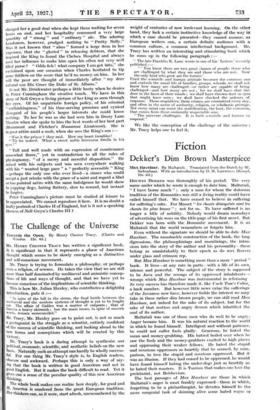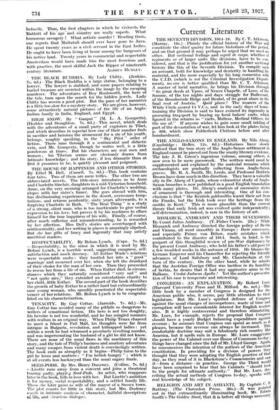Fiction
Dekker's Dim Brown Masterpiece
10s. 6d.)
DOUWES DEKKER was thoroughly of his period. The very name under which he wrote is enough to date him. Multatuli, " I have borne much " : only a man for whom the dolorous tradition of the Romantics was still a living reality could have called himself that. We have ceased to believe in suffering for suffering's sake. For Musset " les chants deses-peres stint les chants les plus beaux" ; not for us. To have suffered is no longer a title of nobility. Nobody would dream nowadays of advertising his woes on the title-page of his first novel. But Dekker was born with the Romantic movement. It is as Multatuli that the world remembers or forgets him.
Even without the signature we should be able to date Max Havelaar. The ramshackle construction of the book, the long digressions, the philosophizings and moralizings, the intru- sions into the story of the author and his personality—these belong as unmistakably to their epoch as do wax flowers under glass and crimson rep.
But Max Havelaar is something more than a mere " period " book. It lives—at any rate in parts—with a life of its own intense and powerful. The subject of the story is supposed to be Java and the wrongs of its oppressed inhabitants— wrongs which Max Havelaar was instrumental in reforming its very success has therefore made it, like Uncle Tom's Cabin, a back number. But however little news value the sufferings of the Javanese now have, however feeble the interest we may take in these rather dim brown people, we can still read Max Havelaar, not indeed for the sake of its subject, but for the sake of that restless and angry demon which inhabited the soul of its author.
Multatuli was one of those men who do well to be angry. Anger became him. It was his natural reaction to the world in which he found himself. Intelligent and without patience, he could not suffer fools gladly. Generous, he hated the mean and money-grubbing. His hatred boiled over when he saw the fools and the money-grubbers exalted to high places and oppressing their weaker fellows. He hated the stupid and covetous oppressors so heartily that he seemed, by com- parison, to love the stupid and covetous oppressed. But it was an illusion. If they had ceased to be oppressed, he would have found himself hating the under-dogs just as heartily a' he hated their masters. It is Tsarism that makes one love the proletariat, not Bolshevism.
The best passages of Max Ilavelaar are those in which Multatuli's anger is most frankly expressed—those in which, forgetting to be a philanthropist, he devotes himself to the more congenial task of skinning alive some hated rogue or imbecile. Thus, the first chapters in which he vivisects the Eabbitt or his- age-and country are really superb. What humorous savagery ! What artistic murder ! Reading them,
One regrets that Multatuli should ever have gone to Java. He spent twenty years as a civil servant in the East Indies. He ought to have been living at home among the burgesses of his native land. Twenty years in commercial and respectable Amsterdam would have made him the most ferocious and, 'with practice, the most skilful Jack the Ripper of nineteenth











































 Previous page
Previous page